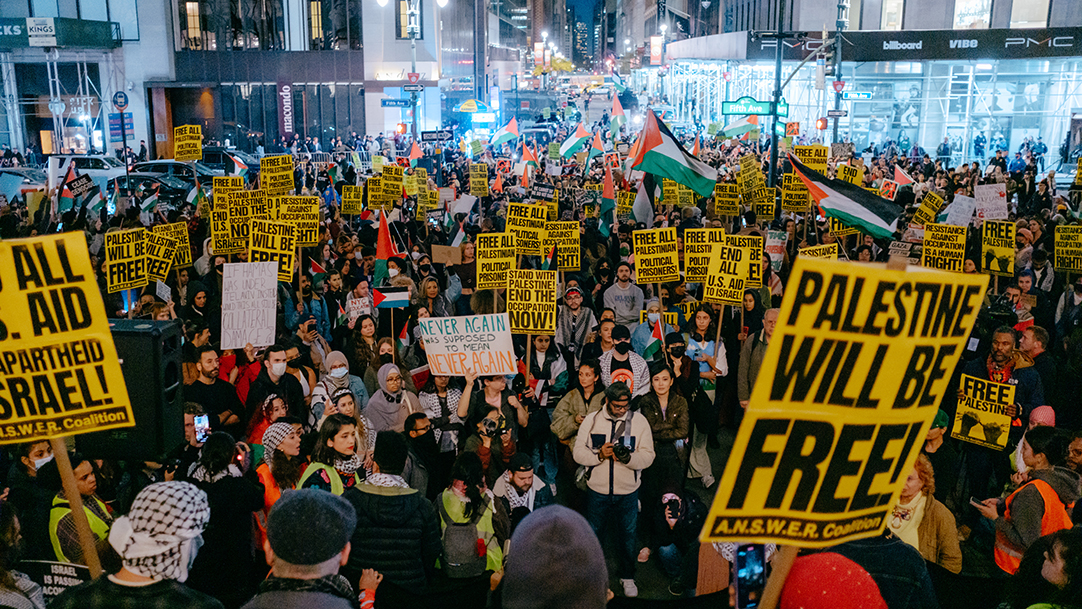In the early hours of November 22, Israeli and Hamas officials announced that they accepted the agreement brokered by Qatar, Egypt, and the United States for a 4-day pause in aggression in the Gaza Strip, which includes the exchange of 150 Palestinian political prisoners for 50 non-military Israeli hostages, as well as the entry of 300 trucks of humanitarian aid into the besieged Gaza Strip.
This temporary pause comes after Israel has slaughtered over 14,500 Palestinians in Gaza, with 7,000 still trapped under the rubble and over 35,000 wounded. Israel’s airstrikes on hospitals and civilian infrastructure as well as the complete blockade on the enclave means that the thousands of injured have limited access to care and the population overall has restricted access to medicine, water, food, fuel, and electricity. The Government Media Office in Gaza reports that 1.5 million Palestinians have been displaced, with 233,000 homes partially damaged and 45,000 completely damaged. 266 schools have been damaged, and 67 are now out of service. Israel has completely destroyed 85 mosques, and significantly damaged three churches.
“The steadfast resilience and resistance of the Palestinian people has delivered a 4-day pause in the ongoing genocide while securing the imminent release of 150 Palestinian political prisoners,” read a statement signed by the Palestinian Youth Movement, National Students for Justice in Palestine, The People’s Forum, ANSWER Coalition, and the International Peoples’ Assembly.
The groups have called on people to remain in the streets around the world, to ensure that a permanent ceasefire is reached: “We must intensify our commitment and efforts until every single one of our demands is fulfilled: a permanent ceasefire, an end to the siege on Gaza, and an end to all US, Canadian, and European aid to Israel.”
“We call on people of conscience everywhere to Shut it Down on November 24th and to continue protesting, planning and implementing direct actions, and drive campaigns focused on our primary demands,” the statement read, referring to the 3rd announced day of “shut downs” for strategic actions for Palestine.
International NGOs are also pushing for a more permanent ceasefire. In a press briefing on “Ceasefire, Pauses and Safe Corridors” held on November 22, hours after the deal was reached, Joel Weiler, executive director of Médecins du Monde, said “for a medical organization, four days of pause is….band aid, not health care,” arguing it would be insufficient time for treatment of serious injuries. Danila Zizi, Handicap International director for Palestine, said “it’s a kind of drop in the ocean if we don’t have fuel and we don’t have access,” complaining about the lack of clarity around the agreement.
“The only way to meet all these needs,” or respect for human rights and access to healthcare, “is a permanent, sustained cessation of humanitarian law violations and a cease fire long enough to restore human rights to millions of people,” said Paul O’Brien, Executive Director of Amnesty International USA. “That’s why we’re joining this call for an immediate and sustained ceasefire.”
Regarding the announcement of the agreement, Hamas stated, “The terms of this agreement were formulated according to the vision of the resistance and its determinants, which aim to serve our people and enhance their steadfastness in the face of aggression, constantly mindful of their sacrifices, suffering, concerns, and managing these negotiations from a position of steadfastness and strength in the field, despite the occupation’s attempts to prolong and procrastinate the negotiations.”
Israeli newspaper Haaretz reported that this exact same deal was put forward to Prime Minister Benjamin Netanyahu previously, but was rejected. According to an analysis piece in the Israeli paper of record, Netanyahu caved under pressure from the families of Israelis held hostage in Gaza as well as the IDF, Shin Bet, and the Mossad. Multiple reports indicate that Israeli airstrikes in Gaza have killed many of their own hostages.
On Wednesday, Lieutenant Colonel Richard Hecht, the IDF’s international spokesperson, said in a press briefing that, “our terminology is not ceasefire, our terminology is an operational pause,” implying that Israel could resume violence once the hostage exchange is complete. Hecht also suggests that the pause might not begin in over 24 hours.
Wounded and hospitalized Gazans continue to be targeted by the IOF, with convoys evacuating the wounded obstructed by Israeli forces at checkpoints or Israelis launching further airstrikes near hospitals, such as the Al-Aqsa Martyrs Hospital and the Al-Yemen Al-Saeed Hospital.
“As medical humanitarians, we reassert that hospitals should never, under any circumstances be a target,” asserted Avril Benoît, Executive Director of Doctors Without Borders/Médecins Sans Frontières in the United States, in Wednesday’s press briefing. She added, “It’s dangerous and terrifying to think what is happening to the norms, to the laws of war. It’s like this dystopian reality now where all the normal scaffolding of what is the conduct of responsible parties in a conflict are being completely perverted.”





